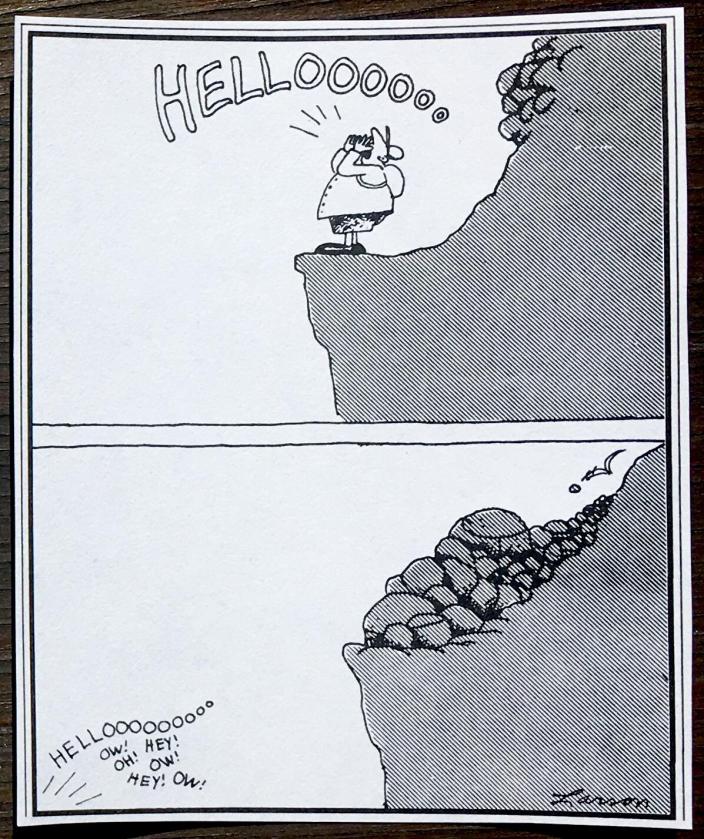The extraordinary impact of sound.
by Dave Skipper
DEPARTMENT PAGE FOR THIS SERIES: EFFECTS OF NOISE
NEXT ARTICLE IN THIS SERIES: pending
The following three Far Side cartoons by Gary Larson wonderfully encapsulate noise’s propensity to generate unanticipated and ultimately catastrophic results:



Intentionally harnessing the features and effects of noise in the form of noise music is the topic of the article series Desire for Noise, wherein I elucidate more than 30 reasons for pursuing noise. (I even managed to get each of them start with the letter ‘E’ – see the list in the introductory article Desire for Noise.)
This series – Effects of Noise – will be more wide-ranging, taking into account both beneficial and adverse consequences of noise, across a fuller spectrum of sound/noise categories. The effects of noise (whichever form of sonic noise is under consideration) impinge on the following recipients:
- On humans
- Physical/physiological effects
- Psychological/emotional effects
- Social effects
- On animals and ecosystems
- On materials
- Natural objects and structures
- Man-made objects and structures
Differing and overlapping effects also need to be considered across the interfaces of soundwaves and sound in general, noise, noisy sounds, noise music, and music. Inevitably there is also a lot of convergence between the effects of noise and the functions and purposes of noise.
In no particular order, here are a sprinkling of topics that I aim to touch upon to some degree within this series:
- Emotional responses to noise: from the calming sounds of nature to the irritation of traffic noise, via the vast diversity of music tastes; good vibes and bad vibes; sound and the power of memory
- Physiological effects of noise: synchronisation and disruption of body and life rhythms; the effects of extreme volume and specific frequencies and frequency ranges, eg tinnitus and other noise-induced medical conditions; hypnosis and trance-like states via sound and rhythm
- Noise and the senses: synesthesia, deafness, the difference between knowing or not knowing the source of a sound
- Noise and submersion/immersion: underwater sonics, sounds in the womb, surround sound music
- Noise trickery: atmospheric conditions, echo and reverberation, binaural effects, aural hallucinations
- Physics of sound: constructive and destructive interference of soundwaves, pressure waves, sonic booms
- Consequences of the sonic aspect of natural disasters: structural damage, human response, atmospheric sound effects, etc
- Effects and applications of ultrasound and infrasound: sonar, medical technology, military technology, etc
- Noise weaponry: sonic bullets/grenades/mines/cannons, noise as torture
- Modes of listening: acousmatic listening, not listening, headphones, anechoic chambers, ear cleaning exercises, amplification
- Reducing noise: insulation and soundproofing, noise-cancelling headphones, earplugs; effects of silence, right to silence?
- Intentional noise exposure: occupational hazards, masochistic suffering and glory, noise as mask
- The power of noise to create or disrupt community: antisocial, asocial, social; the importance of culture and context in defining noise and understanding the effects of noise (subjective or objective, perceived and/or real)
- Noise pollution, noise abatement, noise levels, noise laws
- Noise rights, noise rites: the right to peace and quiet vs the right to make noise – power, politics, and religion
- Responsible noise-making, responsible listening
Let me know if there’s a topic you’d like me to add to this list.
Why do I want to write about these matters? Out of sheer curiosity? Check. In an effort to make my writings about noise somewhat comprehensive? Check.
But more than these, I believe that paying attention to the effects and impact of noise is necessary and should inform my efforts to be a ‘responsible noisician’, for want of a better term. Most of these articles will be a mixture of anecdote, science, description, and examples, but I will also throw in some ideas and opinions along the way.
As a Christian, the Bible states that my body is “a temple of the Holy Spirit” and that I should therefore honour God with my body (1 Corinthians 6:19-20). Although the specific context there is about sexual immorality, the wider point holds: I should both look after my body (and thus be careful about the impact of noise on my ears, for example) and use my body wisely (and so be considerate of other people through the sounds and sound-generating actions that I make). The latter point is made explicit in such commands as to “Love your neighbour as yourself” (e.g. Matthew 22:39) and to “Do to others what you would have them do to you” (known as the ‘Golden Rule’, e.g. Matthew 7:12).
And so in this series I will at times be drawing on various principles, commands, proverbs, and descriptions from the Bible that help to give practical wisdom and guidelines regarding some of the effects of noise. There are some great nuggets in there that can apply insight into such themes as noise pollution and conflict resolution, the treatment of animals, the sounds of natural disasters, and the power of sound to create, heal, or destroy. The end result of my analysis of the effects of noise will hopefully yield some helpful ideas that may contribute towards an ethics of noise that allows for both a celebration and exploration of noise and a sensitivity to the dangers and annoyances of noise. Don’t expect anything groundbreaking, I just want to pull some strands together through an uncommon matrix.
Noise kills! Stop the noise!
Make more noise! Long live noise!
You’ll be hearing from me again soon…
He who has ears to hear, let him hear!
DEPARTMENT PAGE FOR THIS SERIES: EFFECTS OF NOISE
NEXT ARTICLE IN THIS SERIES: pending

You might enjoy taking a look at Hildegard von Bingen, an Abbess, who in 1178 with her community was forbidden to sing. She refused and said that “evil will fill the vacuum created by the lack of music in Rupertberg (Abbey)”. She wrote higly unusual music, which she called Cosmic Music. https://www.resourcingmission.org.uk/music/classical/hildegard-bingen
LikeLiked by 1 person
Very interesting, thanks for the pointer and link!
LikeLike